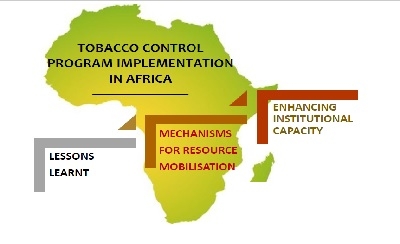
Harare, 15 September 2017 (ACBF) –Civil society organizations and other stakeholders actively engaged in tobacco control in Africa will converge on Harare from 25 to 29 September at the behest of the African Capacity Building Foundation (ACBF) to improve on their knowledge of good practices in the fight against the use of the drug that is proving costly for both the health and economic wellbeing of many Africans.
The World Health Organization (WHO) estimates that smoking kills more than 7 million people every year and costs households and governments over US$ 1.4 trillion through healthcare expenditure and lost productivity. Though only 2% of cigarettes smoked globally are in Africa, 6% of smokers live in Africa. Despite Africa having the lowest smoking prevalence in the world, the continent presents the greatest threat in terms of future growth in smoking. Currently, over 77 million adults smoke in Africa. This figure is expected to grow steadily over the next century, reaching 413 million smokers by 2100. Particularly worrying is the projection that by 2030 the number of smokers in Africa is anticipated to rise by nearly 40% from 2010 levels.
It is against this gloomy backdrop that ACBF undertook to coordinate an Africa-wide program on tobacco which received a three-year umbrella funding from the Bill and Melinda Gates Foundation in 2014. So far, the effort across Africa has been yielding fruits with countries adopting stricter laws/regulations on tobacco control, notably on tobacco taxation, advertising bans, graphic warning labels, and smoke-free environments. In this conjuncture, ACBF’s approach with the partners to gather at the Harare meetings, include strategic grant making to, and capacity building of, the Center for Tobacco Control in Africa (CTCA) based at the Makerere University in Kampala, Uganda; the Economics of Tobacco Control Project of the University of Cape Town (UCT), South Africa; and 8 selected CSOs in 8 countries.
The first of the two Harare meetings from 25 September would be a Tobacco Control Mid Term Review (MTR) Validation workshop, while the second will be the Annual Coordination meeting for the ACBF sub-grantees from the Bill and Melinda Gates funding pot.
The main purpose of the MTR workshop is to share the findings of the MTR and define strategies to boost implementation during the remaining period of the program. The workshop outcomes will include: (i) Increased knowledge on good practices for TC implementation in Africa and (ii) Improved TC project implementation by sub-grantees through MTR lessons learnt.
The annual coordination meeting aims to equip the sub-grantees with relevant skills and competences for resource mobilization, sustainability of the projects and institutional strengthening. The meeting will result in (i) increased knowledge and understanding on TC resource mobilization mechanisms; (ii) Increased understanding and knowledge of institutional capacity building for TC initiatives; (iii) Established collaboration platform and linkages amongst the sub-grantees.
-ENDS HERE-
For more information, please contact:
Abel Akara Ticha – Senior Communication Officer
The African Capacity Building Foundation
Harare, Zimbabwe
+263 7+263-4 304663, 304622, 332002, 332014; Ext. 279
Email: A.Ticha@acbf-pact.org
ABOUT the African Capacity Building Foundation (ACBF)
Having spearheaded and robustly coordinated capacity development programs worth over 700 million US dollars across 45 countries and 8 regional economic communities (RECs) in Africa since 1991, ACBF has gathered the requisite experience that makes it the go-to institution for expert knowledge and human resources to advise and support African countries, regional economic communities and institutions on decisive steps to take to develop the practical skills urgently required for the continent’s economic transformation.
Evidence from our cutting-edge work (constituting hundreds of knowledge publications) and the work of several partners show that Africa's development efforts are being hobbled by severe capacity deficits often in the form of shortage of critical skills, deficits in leadership, inhibiting mindsets and weak institutions. The continent’s practical skills shortage is acute in key areas such as Science, Technology, Engineering and Mathematics (STEM) and Agriculture.
At ACBF, we will continue using our unmatched track record in managing financial facilities for development, our vast knowledge gathering experience thanks to the exceptional skills mix of our core staff as well as our strong strategic partnerships and networks to help countries and institutions identify their capacity needs, advise them on how to plug these capacity weaknesses and on where to find the knowledge and resources to develop the requisite capacity resources, effectively use them and retain them to achieve their short and long-term development objectives.
ACBF’s vision is an Africa capable of achieving its own development.
Support this crucial work
Leverage your own efforts geared towards Africa’s transformation, or
Partner with us by writing to:
B.Kone@acbf-pact.org (to support us with resources for Africa’s Capacity Development)





